Taiwan’s 2024 election delivered a split government, with the Democratic Progressive Party’s (DPP) standard-bearer, Lai Ching-te, winning the presidency and the opposition Kuomintang (KMT) and the Taiwan People’s Party forming a majority coalition in the Legislative Yuan. This distribution of power generated political gridlock. In the period since, President Lai and his supporters grew increasingly frustrated with legislative efforts to change the institutional balance of power between the Legislative Yuan and the executive branch, as well as with the Legislative Yuan’s unwillingness to pass a government-wide annual budget bill, which included a proposed increase in defense spending. Lai’s supporters began questioning whether opposition legislators were acting at the behest of the Chinese Communist Party and whether they should be removed from office for the sake of Taiwan’s national defense. For their part, KMT legislators argued they were providing necessary oversight to ensure fiscal discipline and guard against the misuse of taxpayer funds.
This frustration coalesced in a grassroots campaign to recall KMT legislators. The first recall vote occurred on July 26, with the next round of recall votes scheduled in August. In the end, not a single KMT legislator was recalled in the first round, and all 24 KMT legislators retained their seats.
This result was a rebuke to Lai and his DPP supporters, even though Lai himself did not instigate the recall effort. Voters demonstrated through their vote that they did not subscribe to the recall proponents’ arguments that KMT legislators were obstructing Lai’s agenda at Beijing’s direction. Voters instead favored allowing elected KMT legislators to fulfill their terms in office. Not even accusations of treason were enough to galvanize Taiwan public opinion against the KMT legislators up for recall.
Taiwan’s government remains divided
In the end, Taiwan’s government remains divided, just as it was before the recall election. A key question going forward will be whether the KMT will be able to capitalize on this result and build public support for its vision for Taiwan’s future. To do so, the KMT will need to develop a compelling appeal to Taiwan’s young voters, many of whom are alienated from both major political parties and thus serve as a swing vote. The KMT’s first test will be elections for local leaders in late 2026. Historically, the KMT outperforms the DPP in local elections. The KMT currently holds 14 out of 22 local government districts. If this trend continues during the next local elections in late 2026, the KMT will have momentum heading into Taiwan’s next presidential and legislative elections in January 2028.
While the KMT appears to be in a strengthened position now following voters’ rebuke of the DPP’s recall effort, it remains premature to suggest that this momentum will hold. It is worth recalling that the DPP got trounced in the 2018 local elections. The election results prompted then-President Tsai Ing-wen to resign as DPP chair. Soon thereafter, she received a challenge for her party’s nomination for reelection as president from none other than Lai. Tsai’s political future appeared bleak until Beijing decided to use heavy-handed tactics to suppress protests in Hong Kong. Tsai harnessed public outrage over China’s intervention in Hong Kong politics to win reelection. In other words, a lot can happen in Taiwan politics very quickly.
The view from Beijing
From Beijing’s perspective, the best scenario in Taiwan is a government that is supportive of official engagement across the Taiwan Strait. Beijing has unilaterally determined that Taiwan’s leader must adhere to a consensus (e.g., the 1992 Consensus) whereby both sides agree there is only “one China” as a prerequisite for official engagement.
A second-best outcome for Beijing is a divided government. Beijing assumes that democratic checks and balances under a divided government will prevent Taiwan from taking precipitous actions, such as moving toward permanent independence. From Beijing’s perspective, the worst-case outcome is a unified government under DPP control.
During the recall campaign, Chinese officials and state media defended KMT legislators, presenting them as victims of political persecution by the DPP. They accused Lai and his DPP supporters of trying to suppress dissent and impose dictatorial powers on the people of Taiwan. In an Orwellian twist, they also urged Taiwan voters to uphold democratic norms by rejecting the recall campaign.
After the results of the recall came out, China’s Taiwan Affairs Office spokesperson, Chen Binhua, declared the DPP “has lost public support and its policies run counter to the true mainstream public opinion in Taiwan.” Chen argued that the recall campaign’s failure symbolized public opposition to the “DPP’s manipulation of democracy and monopolization of power.”
Beijing likely feels relieved that the recall campaign fizzled. As a result, the DPP likely will struggle to pass major increases in defense spending or other signature initiatives. Chinese commentators will encourage a perception of Lai as a lame-duck leader. Beijing will not miss opportunities to discredit Lai and other DPP leaders as part of its efforts to diminish public support for the DPP and encourage greater support for Taiwan leaders who are supportive of deeper cross-Strait engagement.
The view from Washington
Trump administration officials did not make any public comments about the recall campaign or its results. This likely reflects a deliberate decision by the United States not to interfere in Taiwan’s internal political processes.
America’s foremost interest in the Taiwan Strait is to uphold peace and stability. The outcome of the recall campaign has the potential to cut in two directions as it relates to this interest. On the one hand, if the outcome leads to prolonged political gridlock that holds back Taiwan’s investments in its national security, it will raise concerns in Washington about Taiwan’s readiness for self-defense. On the other hand, if the outcome of the recall election funnels political energy into a future-oriented contest to persuade voters of who can best protect peace and preserve the status quo, then it could have a moderating effect on Taiwan’s political discourse. This would be welcomed in Washington.
A major wild card for Washington will be whether Beijing interprets the election results as a license to push further on Taiwan, or whether it views the results as validating its long-term strategy to wear down the psychological will of the people of Taiwan. If the latter, Beijing conceivably could take a more patient, long-term approach to Taiwan. Alternatively, Beijing might feel emboldened by its recent efforts to influence public attitudes in Taiwan and grow even more aggressive in doing so going forward.
The answer to the question of what lessons Beijing will draw from the recall campaign presently is unknowable. To the extent history offers a guide, it would suggest a higher likelihood that Beijing will grow more assertive vis-à-vis Taiwan, rather than less so. Beijing generally acts most aggressively when it feels comfortable and confident, and it exercises restraint when it feels a need to regenerate or preserve national power. Yet between now and the 2028 elections, China will not exert so much pressure that it alienates voters who might otherwise support the KMT. Thus, a calibrated, two-handed approach is most likely.
If Beijing grows bolder in pressuring Taiwan, President Donald Trump will face calls in Washington to respond in kind with countervailing support for Taiwan. If Trump is focused on protecting his self-image of strength and resolve, he could approve efforts to demonstrate greater support for Taiwan to maintain a strategic equilibrium in the Taiwan Strait. This could include greater rhetorical support for Taiwan, increased arms sales, higher visibility U.S. military presence operations around Taiwan, or more visible high-level interactions between U.S. and Taiwan officials.
Conversely, if Trump is in dealmaking mode with Chinese President Xi Jinping, as he appears to be now, he could view adjustments to America’s long-standing policy toward Taiwan as a necessary concession in exchange for progress on his trade priorities with China. Any attempt by Trump to barter America’s policy on Taiwan for more favorable trade terms with China would represent a significant departure from America’s long-standing focus on preserving peace and stability in the Taiwan Strait. It would be a decision that would leave America less secure and China more emboldened. Beijing’s appetite would grow with eating. As a result, America would need to grow more directly involved in protecting peace in the Taiwan Strait. Anything less would challenge the credibility of America’s security commitments and risk America’s access to vital semiconductor and technological inputs upon which America’s development depends.
The real world is unlikely to present a clean binary choice for Trump between protecting his image for strength versus projecting his image as a dealmaker. Events may force him to oscillate between the two. If Trump judges that Beijing goes too far in terms of ratcheting up pressure on Taiwan, he could feel compelled to counterbalance the People’s Republic of China’s pressure. For example, Trump has done a version of this zigzag in his approach to Ukraine and NATO in recent months. When Trump judged that Ukrainian President Volodymyr Zelenskyy was an obstacle to a Russia-Ukraine ceasefire, he publicly humiliated Zelenskyy in the Oval Office. Now that Trump has determined that Russian President Vladimir Putin is obstructing progress, he has returned to providing support to Zelenskyy.
Trump’s shifting stance on Ukraine suggests a real possibility that he could pursue a similarly adaptive approach to managing cross-Strait relations. Trump views his unpredictability as a strategic asset. This will make it even more important that Trump and his senior advisors operate with a clear view of America’s long-term strategic interests, topmost of which is preserving peace and stability in the Taiwan Strait.
-
Acknowledgements and disclosures
The authors would like to thank Adrien Chorn for his research assistance on the piece, as well as Rachel Slattery for layout and Adam Lammon for editing.
The Brookings Institution is committed to quality, independence, and impact.
We are supported by a diverse array of funders. In line with our values and policies, each Brookings publication represents the sole views of its author(s).



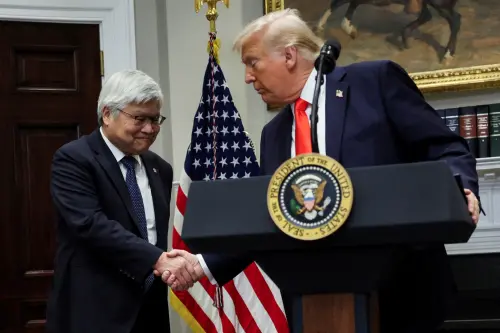
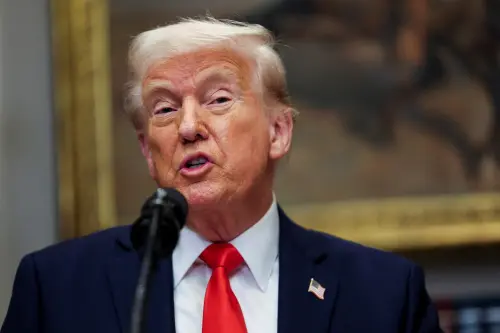
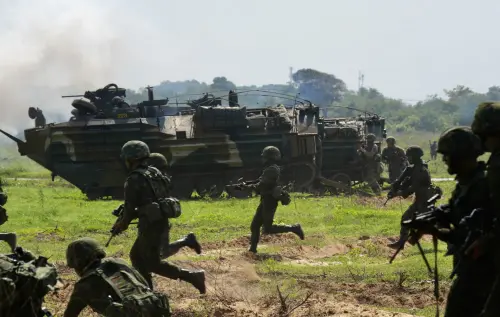
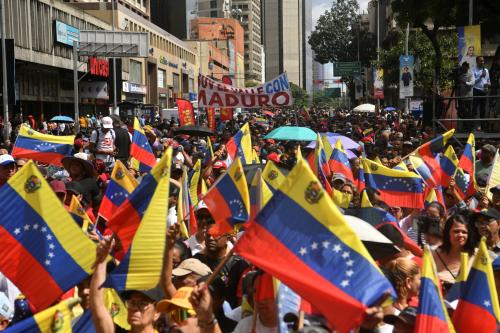
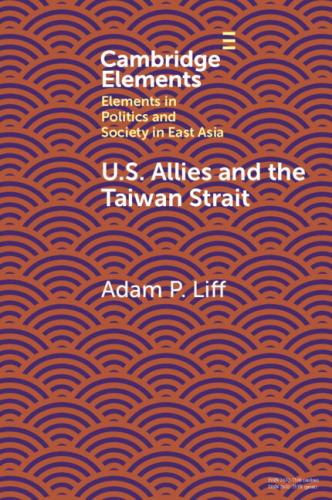

Commentary
Taiwan’s recall vote: Implications for Taiwan, China, and the United States
August 1, 2025